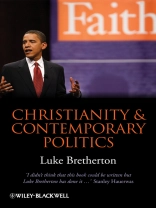Congratulations to Luke Bretherton on winning the 2013 Michael Ramsey Prize for Theological Writing for Christianity and Contemporary Politics!
Relations between religious and political spheres continue to stir passionate debates on both sides of the Atlantic. Through a combination of theological reflection and empirical case studies, Bretherton succeeds in offering timely and invaluable insights into these crucial issues facing 21st century societies.
- Explores the relationship between Christianity and contemporary politics through case studies of faith-based organizations, Christian political activism and welfare provision in the West; these case studies assess initiatives including community organizing, fair trade, and the sanctuary movement
Offers an insightful, informative account of how Christians can engage politically in a multi-faith, liberal democracy - Integrates debates in political theology with inter-disciplinary analysis of policy and practice regarding religious social, political and economic engagement in the USA, UK, and continental Europe
- Reveals how Christians can help prevent the subversion of the church – and even of politics itself – by legal, bureaucratic, and market mechanisms, rather than advocating withdrawal or assimilation
- Engages with the intricacies of contemporary politics whilst integrating systematic and historical theological reflection on political and economic life
Innehållsförteckning
Preface.
Acknowledgments.
Introduction.
The Terms and Conditions of Political Life.
Religion and Postsecular Politics.
Theological Politics and the Ecclesial-Turn.
Summary of Aims and Methodology.
1. Faith-Based Organizations and the Emerging Shape of Church–State Relations.
Introduction.
’Working Together’: The Shaping of Relations between the State and Religious Groups in a Multi-Faith Society.
Social Cohesion, Social Capital, and the ’Salvation’ of Civil Society.
Liberalism and the Continuing Requirements of Public Reason.
Theological Politics and the Question of What Constitutes Faithful Witness.
Ecclesiology and the Political Mission of the Church.
Summary.
2. Local: Augustine, Alinsky, and the Politics of the Common Good.
Introduction.
The Alinsky Approach: The Work of Broad-Based Community Organizing.
Eschatology, Politics, and the Mutual Ground of the Saeculum.
Christian Realism Redivivus?
A Thomistic Democratic Politics?
Reweaving Civil Society.
Politics without Piety Is Pitiless; Piety without Politics Is Pitiful.
Summary.
3. National: Christian Cosmopolitanism, Refugees, and the Politics of Proximity.
Introduction.
Theological Politics and the Liberal Democratic Response to Refugees.
Refugees as Bare Life.
Bare Life and the Limits of Humanitarianism.
Hallowing Bare Life: A Doxological Response.
Hallowed Be Thy Name.
Sanctuary: The Practice of Hallowing Bare Life.
Summary.
4. Global: Consumerism, Fair Trade, and the Politics of Ordinary Time.
Introduction.
Defining Political Consumerism.
Consumerism and the Formation of Desire.
Political Consumerism as Apprenticeship in the Virtues.
Political Consumerism as Neighbor Love.
Fair Trade as Contradiction.
Fair Trade, Globalization and the Emergence of Political Consumerism.
Ordinary Politics and the Peace of Babylon.
Summary.
Conclusion: Toward a Politics of Hospitality and a Theology of Politics.
Epilogue.
Bibliography.
Index.
Om författaren
Luke Bretherton is Senior Lecturer in Theology and Politics, and Convener of the Faith and Public Policy Forum at King’s College London. He has worked with a variety of faith-based NGOs, missions, and churches in several national and international contexts. He is the author of
Hospitality as Holiness:
Christian Witness Amid Moral Diversity (2006) and Reviews Editor for the journal
Political Theology.







![Omslag till Brian Schrag & Julisa Rowe: Community Arts for God's Purposes [Chinese] 貼近神心意的社群藝術 Omslag till Brian Schrag & Julisa Rowe: Community Arts for God's Purposes [Chinese] 貼近神心意的社群藝術](https://static.worldofdigitals.com/thumb_webp/740/9781645083740.webp)




